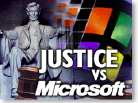|
Case denies conspiracy
|
 |
May 21, 1999: 4:47 p.m. ET
Microsoft lawyers grill AOL chief executive on Netscape merger
|
WASHINGTON (CNNfn) - America Online Inc.'s chief executive officer denied Friday his company was involved in a conspiracy with the Justice Department to hide news of AOL's merger with Netscape Communications Corp.
Microsoft's legal team grilled Steve Case, AOL (AOL) CEO, in a deposition related to Microsoft's ongoing federal antitrust trial.
The Justice Department and 19 states sued Microsoft (MSFT) last year for using its alleged monopoly in the Windows operating system to stifle competition in other segments of the computer industry.
One of Microsoft's long-running arguments, however, is that the government brought charges against the company at the bidding of its competitors, particularly Netscape.
AOL and Netscape were hammering out a deal just as AOL executive David Colburn was set to take the stand for the government in late October.
With that in mind, Warden attempted to establish a time frame regarding when AOL officials notified the Justice Department of its merger negotiations with Netscape.
Case, who appeared relaxed throughout the deposition, acknowledged that AOL's George Vradenburg initially informed Justice Department officials about "sensitive negotiations" with Netscape in mid-October, just prior to Colburn's testimony.
The purpose of the meeting, Case said, was to inform the Justice Department that AOL "might have some objections" to questions that broached those discussions.
Case stressed, however, that government officials weren't notified of the merger itself until just a few days prior to the Nov. 24 announcement. He also noted that Vradenburg said Justice Department officials expressed surprise at hearing about an AOL-Netscape combination.
Warden, however, continued to press Case on the issue, repeatedly asking him what purpose would be served by advising the government on sensitive negotiations with Netscape.
"I think it was obvious," Case said. "We had a lot of thorny issues to resolve about what was going on. I think any company in that circumstance would do the same."
Hiding news of the deal?
Lead Justice Department attorney David Boies later told reporters that Case's remarks laid to rest any claims by Microsoft that AOL and the government conspired to hide news of the Netscape deal for fear of damaging the government's chances of victory over the software giant.
"There was a disadvantage to us in not being able to deal with Mr. Colburn at the time he was on the stand" to demonstrate how the merger had no effect on the trial, Boies said. "I think that disadvantage has been more than taken care of today because we had Mr. Case able to testify to that."
Boies also pointed out that Microsoft was fully aware that AOL was involved in sensitive business discussions, noting that the two sides met in a closed session with U.S. District Judge Thomas Penfield Jackson during Colburn's testimony.
"Microsoft had an opportunity to ask any questions it wanted to about the nature of those sensitive business discussions," Boies said. "Unless Microsoft wants to claim that, like some indigent criminal defendants, they are unable to procure competent counsel on their own, it's really up to them to ask those questions."
Internet effects
The Redmond, Wash.-based software giant has claimed the AOL-Netscape deal, which the companies announced last November, undermines the government's claims that Microsoft has worked to stifle competition in the computer industry. In particular, the company argued that the merger radically changes the competitive landscape of the computer industry.
To that end, Warden focused much of his questioning Friday on new developments in the Internet market.
The defense lawyer hinted at, rather than explicitly asked, whether the proliferation of high-speed Internet access would favor Internet service providers such as AOL more than it would PC companies such as Microsoft.
At one point, Warden asked Case if broadband Internet access would have an impact on software distribution.
Case acknowledged high-speed Internet access could affect "some kinds of software distribution."
Under questioning from lead Justice Department attorney David Boies, however, Case maintained that Microsoft would continue to hold its dominant position in the PC industry for the foreseeable future.
Boies cited a column published in the Washington Post on Jan. 6, 1999, which quoted Case as saying it would be "hard to imagine the PC won't be the dominant way to log on to the Internet, and that Windows has a lock" on the PC.
"Was that your view on January 6, 1999?" Boies asked.
"Yes," Case replied.
"Is that your view today?"
"Yes," Case said.
Case was also quoted as saying AOL has no intention of competing with Microsoft in its core operating system business.
A person familiar with Microsoft's defense, however, said Case was being disingenuous in his remarks.
"It's one thing to say in the Washington Post that you have no intention of competing with Microsoft's operating system," the person said. "But when you pour your energy into working with hardware and software companies to create technologies where familiar computing tasks are done under AOL technology, of course you're competing with Microsoft."
Deal made despite browser
Among the government's key claims in the trial is that Microsoft used its monopoly power to destroy the competitive threat posed by Netscape.
The company also contends Netscape's $10.1 billion price tag proves the company was able to thrive in a competitive environment, thereby nullifying the government's case.
But Case said AOL was willing to proceed with the deal despite its reservations about Netscape's dwindling market share in Web browsers -- market share that was lost to Microsoft.
The next phase of the trial, during which each side will call three rebuttal witnesses, is scheduled to begin June 1.
Microsoft will call AOL's Colburn as a hostile witness, an indication that it intends to make the AOL-Netscape deal a cornerstone of its rebuttal defense.
Microsoft shares lost 15/16 Friday to close at 77-1/2. AOL shares fell 3-1/16 to 126-7/16.
-- by staff writer John Frederick Moore
|
|
|
|
|
 |

|

